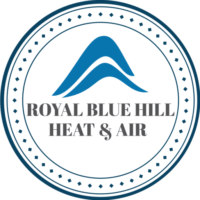DIY HVAC Maintenance

What You Can Do vs. When to Call a Pro
Regular HVAC maintenance is essential for keeping your system running efficiently and avoiding costly breakdowns. While some maintenance tasks are simple enough for homeowners to handle, others require professional expertise. Here’s a guide to what you can do yourself and when it's time to call a Royal Blue Hill Heat and Air, Inc. HVAC technician.
1. Replace Air Filters Regularly
- Change air filters every 1-3 months, depending on usage and indoor air quality.
- Use high-efficiency filters (HEPA or high MERV rating) for better filtration.
- Check filters monthly for dirt buildup and replace them as needed.
2. Keep Vents and Registers Clean
- Dust and vacuum vents regularly to prevent airflow restrictions.
- Ensure vents are not blocked by furniture, rugs, or curtains.
3. Clean Around the Outdoor Unit
- Remove leaves, dirt, and debris from around the condenser unit.
- Trim vegetation at least two feet away to allow proper airflow.
- Gently rinse the unit with a hose (never use a pressure washer).
4. Check and Adjust Your Thermostat
- Replace old thermostats with programmable or smart thermostats for efficiency.
- Set energy-efficient temperature settings.
- Ensure the thermostat is calibrated correctly and functioning properly.
5. Inspect and Clean Drain Lines
- Pour a cup of vinegar or warm water with mild soap into the condensate drain line to prevent clogs.
- Check for visible blockages and clean if necessary.
6. Seal Air Leaks
- Inspect windows, doors, and ductwork for air leaks.
- Use weather stripping or caulk to seal gaps and improve energy efficiency.
When to Call an HVAC Professional
1. Annual HVAC Tune-Up
- A professional should inspect and service your system at least once a year (preferably in spring and fall).
- This includes checking refrigerant levels, inspecting electrical connections, and testing system efficiency.
2. Unusual Noises or Smells
- Banging, squealing, or grinding noises can indicate mechanical problems.
- Burning or musty odors may signal electrical issues or mold buildup.
3. Weak Airflow or Inconsistent Temperatures
- If some rooms are hotter or colder than others, your system may need adjustments or ductwork repairs.
- Weak airflow could indicate a failing blower motor or blocked ducts.
4. Frequent Cycling or High Energy Bills
- If your system turns on and off too often, it may have a faulty thermostat, dirty coils, or refrigerant issues.
- A sudden increase in energy bills could mean your system is overworking due to inefficiency.
5. Refrigerant Leaks or Ice Buildup
- Ice forming on the outdoor unit or refrigerant lines indicates a possible leak or airflow issue.
- Only a professional can safely handle refrigerant-related repairs.
6. Electrical or Gas-Related Problems
- Flickering lights, circuit breaker trips, or burning smells require immediate attention.
- Gas furnaces with pilot light or carbon monoxide concerns should always be inspected by a pro.
Final Thoughts
Performing routine maintenance can extend the life of your HVAC system and improve efficiency, but some tasks require professional expertise. Knowing when to DIY and when to call an expert can save you time, money, and potential headaches.
For professional HVAC maintenance, repairs, or system inspections, contact Isom Hill at 918-398-3757 or schedule online today!
